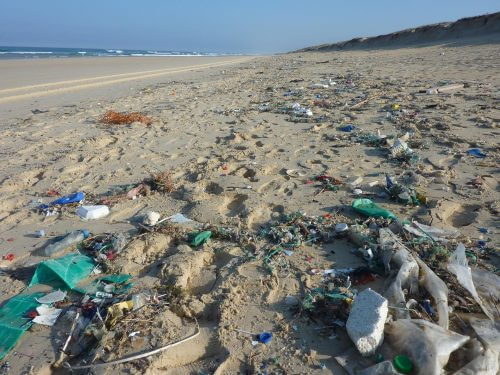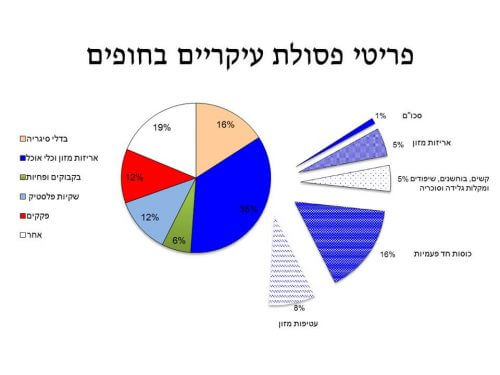A waste survey conducted last June on the country's beaches reveals that there has been an almost 50 percent decrease in plastic bag waste. Is this a sign that the bag law is working?

By Maya Falah, Angle, Science and Environment News Agency
What do you take with you when you go to the beach? It is safe to assume that you have a towel, a mat or a blanket to spread out on the sand, sunscreen, sunglasses, certainly also floats and swimming goggles if you took the children with you; Maybe also a grill or a parasol to make the stay under the scorching sun pleasant. All of these will surely return to your bag safely at the end of the fun, tired but satisfied - just like you.
But what happens to the water or soft drink bottle, the straws, the disposable cups, the popsicle wrapper or the bamba you bought for the kids? All of these often remain on the sand, abandoned in the sun behind you, and some of them will also fly in the wind into the sea and reach the shores of foreign countries, or in the worst case - into the stomachs of various marine animals.
The absolute majority of the waste found on Israel's beaches Made of plastic - which has long since become one of the most alarming nuisances on the planet: not only are items made of plastic often intended for fairly short-term use, so they They find their way to the trash very quickly, but the plastic also pollutes the soil and the landscape, is eaten by the animals and causes them injuries, pollution and suffocation.
A huge amount of the plastic waste we throw away ends up in the sea: 12 million tons of plastic end up in the world's oceans every year – that is, a whole ton of plastic every 2.6 seconds. There the waste accumulates into large floating islands or breaks down into small pieces of micro plastic that harm the animals and the marine environment. By 2050, recent studies estimate, The weight of the plastic in the sea will be greater than the weight of the fish in it. Marine waste - and plastic in particular - also poses a serious environmental risk to human health: studies in the world and in Israel indicate the presence of plastic particles in the bodies of marine animals, including those eaten by humans.
Galia Pasternak, a doctoral student at the School of Marine Sciences at the University of Haifa and an expert on marine pollution, conducted as part of her doctoral thesis Debris surveys on Israel's beaches During the years 2012-2015, in which she discovered that the plastic waste figures on Israel's beaches are extremely bad compared to global figures: while the global average is 75 percent plastic on the beaches, in Israel the plastic made up 90 percent of the waste on the beaches. Despite this, in a survey conducted by Pasternak last June, she actually came across some happy news: this time there were far fewer plastic bags waiting for her at the beaches than before.
Where did the bags go?
"The results of my doctoral research, which were based on an average of the 19 surveys we conducted on eight beaches between these years, indicated that most of the waste on Israel's beaches is local, and the main source is beach vacationers," says Pasternak. "The results showed that 55 percent of all the marine waste whose origin was identified was of coastal origin, and from identifying items according to the labels it was found that 75 percent of the waste was produced or marketed in Israel. 90 percent of the waste, as mentioned, was made of plastic.' In classifying the most common items of waste, Pasternak found that 32 percent of the waste found on the beaches are disposable utensils and food packaging, followed by plastic bags - 23 percent, cigarette butts - 12 percent, bottle caps - 11 percent, and plastic bottles - five percent.
"I carried out the last survey during the month of June 2017 on five undeclared beaches: Zikim, Ma'agan Michael, Kiryat Haim, Batsat and Acre", says Pasternak, "I also carried out the previous surveys on all of them. The surveys are conducted on undeclared beaches only, because these are the beaches that are included in the programclean beachof the Ministry of Environmental Protection, and the local authorities are responsible for their cleaning.
"In the survey we did see that plastic still makes up 90 percent of the waste, but the happy statistic was that the relative amount of bags on the beaches dropped to 12 percent - probably thanks to the bag law that came into effect at the beginning of the year," she says.

In Israel - before the application of the law - theA consumer's average usage About 350 single-use "undershirt" type bags per year. This is a much higher use than is common in most EU countries, and Western European countries in particular - where the use is between 50 and 200 bags per person per year. as per Data published by the Ministry of Environmental Protection Last May, while in the fourth quarter of 2016 the major retailers reported purchasing more than 280 million bags for distribution, in the first quarter of 2017 they sold only about 55 million bags. This is a reduction of more than 80 percent.
These data are consistent with Pasternak's survey data. It seems that the bag law - under which, since the beginning of 2017, consumers are required to pay 10 cents per bag in the major retail chains - has already achieved noticeable results, even in a certain decrease in the relative amount of plastic bags on the beaches. However, the law currently applies only to the large grocery chains (and even there - only regarding standard checkout bags with handles, and not regarding the rolls of bags in the fruit and vegetable department), and not in other stores (clothing, footwear, smaller food stores, etc.).
"The presence of fewer bags on the beaches raises the question - could it be that even though the law currently only applies to the large grocery chains, it causes Israelis to take fewer bags in other places as well?" wonders Pasternak. And really, could this be a sign that we are witnessing the beginning of a change of consciousness among the Israelis? time will tell.
Discount for those who bring a reusable cup
Pasternak brought up additional interesting data from the latest survey regarding the nature of the waste on the beaches. She found that while cutlery makes up only one percent of all plastic waste, food packaging and wrappers make up 13 percent of it, drinking straws (candy sticks, popsicle sticks, and wooden skewers) make up five percent of all waste, while single-use plastic cups make up 16 percent of plastic waste in the beach.
These findings indicate that a reduction in the source of the use of disposable utensils and food packaging (most of which are made of plastic), may significantly reduce the amount of marine litter. In view of the growing consumption of single-use utensils - evident among other things in the significant increase in stores for these products - Pasternak offers a number of steps that can help reduce the use of plastic.
"There is a need for legislation to reduce the marketing of these products, although an examination is required of how to do it correctly - in a way that does not harm weak and special populations, and does not create a deception in the public," says Pasternak. "In order to create a change in the norms of behavior among the public, informational actions and campaigns are needed - which will encourage, for example, the use of reusable utensils, stopping the use of straws, selling bottles in which the corks are opened without detaching from the bottle, and products with less packaging.
"At the local level, the local authorities can reduce the waste on the beaches with a variety of measures," she adds. "It is possible to encourage kiosks and restaurants along the beach to keep their environment clean - by conducting promotions in which those who bring waste collected on the beach will receive a discount, reducing the serving of drinks in plastic cups (for example by giving a discount to those who bring a reusable cup), banning the serving of keshes, serving drinking bottles No traffic jam, quick clearing of the tables and waste collection around the business. It is possible to create awareness on the beaches through signage or the use of volunteers, establish a ban on bringing single-use plastic utensils to the beach, place trash cans and recycling containers at the entrance to the beaches and strengthen enforcement against litterers. In addition, it is important to clean the beach throughout the day, in order to create a clean atmosphere on the beach - which encourages maintaining cleanliness.
"There is no shortage of things that can be done. "There is an initiative abroad called the 'Plastic-Free July Challenge,'" says Pasternak, "It's an initiative that originated in Australia, which is becoming more and more common in the world - and as part of it, people are asked to try to reduce their use of plastic in the month of July. If not to stop it completely, then at least stop using certain products that are problematic, such as drinking straws and plastic bags. The goal is mainly to make people understand how much they use plastic, and encourage them to reduce their use. I think that the public's awareness of the issue plays a very fundamental role in the issue of reducing plastic waste, on the beaches and in general."

3 תגובות
very bad
According to what I see in supermarkets, many people still take bags without a bill and the 10 cents doesn't move them much.
If the money charged for bags was returned as a deposit for the return and collection of plastic, the law would be much more effective and help poor people.
Like the law of the small bottles, cans, etc. that have a "deposit" on them, so poor people collect them and hardly ever see such waste.
Again and again it turns out that the inhabitants of the beautiful country
We specialize in dispersing garbage and making noise! ! !